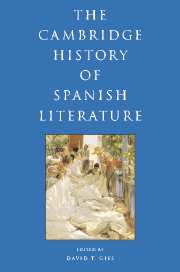Book contents
- Frontmatter
- I INTRODUCTION
- II HISTORY AND CANONICITY
- III THE MEDIEVAL PERIOD
- IV EARLY MODERN SPAIN: RENAISSANCE AND BAROQUE
- V THE ENLIGHTENMENT AND NEOCLASSICISM
- VI THE FORGING OF A NATION: THE NINETEENTH CENTURY
- VII THE MODERN, MODERNISMO, AND THE TURN OF THE CENTURY
- VIII TWENTIETH-CENTURY SPAIN AND THE CIVIL WAR
- IX IN AND OUT OF FRANCO SPAIN
- 46 The literature of Franco Spain, 1939–1975
- 47 Twentieth-century literature in exile
- 48 Prose in Franco Spain
- 49 Poetry in Franco Spain
- 50 Theatre in Franco Spain
- 51 Film and censorship under Franco, 1937–1975
- X POST-FRANCO SPANISH LITERATURE AND FILM
- Bibliography
- Index
- References
46 - The literature of Franco Spain, 1939–1975
from IX - IN AND OUT OF FRANCO SPAIN
Published online by Cambridge University Press: 28 March 2008
- Frontmatter
- I INTRODUCTION
- II HISTORY AND CANONICITY
- III THE MEDIEVAL PERIOD
- IV EARLY MODERN SPAIN: RENAISSANCE AND BAROQUE
- V THE ENLIGHTENMENT AND NEOCLASSICISM
- VI THE FORGING OF A NATION: THE NINETEENTH CENTURY
- VII THE MODERN, MODERNISMO, AND THE TURN OF THE CENTURY
- VIII TWENTIETH-CENTURY SPAIN AND THE CIVIL WAR
- IX IN AND OUT OF FRANCO SPAIN
- 46 The literature of Franco Spain, 1939–1975
- 47 Twentieth-century literature in exile
- 48 Prose in Franco Spain
- 49 Poetry in Franco Spain
- 50 Theatre in Franco Spain
- 51 Film and censorship under Franco, 1937–1975
- X POST-FRANCO SPANISH LITERATURE AND FILM
- Bibliography
- Index
- References
Summary
In an essay in El furgón de cola (“The Caboose,” 1976) on the situation of the Spanish writer in the 1960s, Juan Goytisolo (1931–) wrote, “la literatura española contemporánea es un espejo de la lucha oscura, humilde y cotidiana del pueblo español por su libertad perdida” (“contemporary Spanish literature is a mirror of the dark, humble, daily struggle of the Spanish people for its lost liberty”). While Goytisolo’s views on the literary culture of the Franco period would change in the waning years of the dictatorship, this statement reflects a widely held sentiment on the part of a variety of Spanish intellectuals during the three and a half decades of the regime. Even those writers who had not sided with the Second Republic – Dionisio Ridruejo (1912–1975), José María Pemán (1898–1981), Camilo José Cela (1916–2002), Ernesto Giménez Caballero (1898–1988) are a few examples – were confronted with the daunting obstacles to freedom of expression that had been written into Spanish law. For Goytisolo these prohibitions amounted to what he called “el toro de la censura” (“the censorship bull”), a bull that had gored many Spanish writers regardless of their literary skills.
It would be reductive, however, to subsume all the literature of that period – prose, poetry, essays, drama – into an all-encompassing category of a committed open resistance to the government’s impositions. Resistance to the dominant ideology took many forms, often corresponding to the transformations of Spanish economics and politics. Within this pattern the most important developments for literary culture revolved around the censorship laws.
- Type
- Chapter
- Information
- The Cambridge History of Spanish Literature , pp. 609 - 619Publisher: Cambridge University PressPrint publication year: 2005



